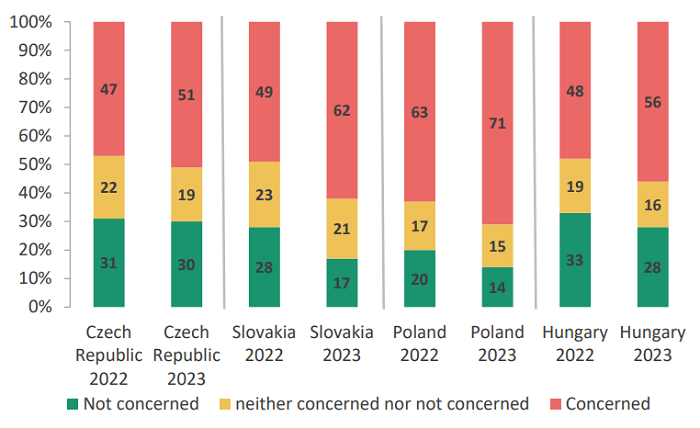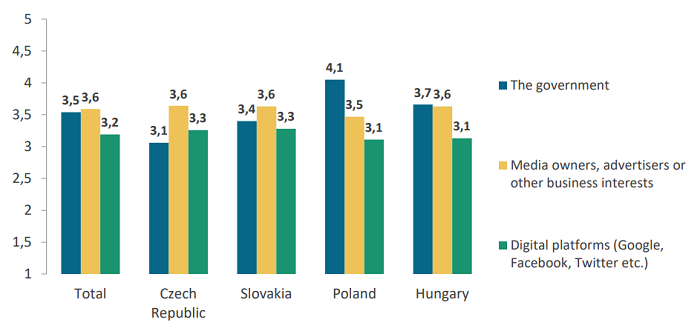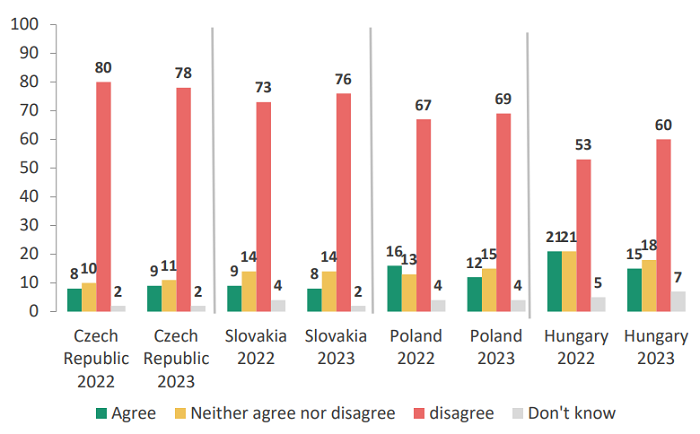The overwhelming majority of the public in the Central European countries (Czech Republic, Slovakia, Poland, Hungary) recognise the importance of independent media, but at the same time perceive the deteriorating influence of media owners and governments on journalistic content. This is according to this year's study on media freedom in Central Europe. The research was conducted through telephone and online interviews. between 6 and 21 March 2023 on a representative sample of 4,023 people in Poland, the Czech Republic, Slovakia and Hungary.
The study also shows that concerns about media freedom have increased significantly in Slovakia and Poland. In Poland, 71% of respondents are concerned about media freedom, an increase of eight percentage points compared to last year. According to the survey, it is the governments of Poland and Hungary that are seen as the biggest threats to media freedom. In the Czech Republic and Slovakia, on the other hand, media owners and their business interests are seen as the primary threat.
Media diversity is perceived as relatively higher in the Czech Republic and Poland, while it is lower in Hungary.
 Concerns about media independence in Central European countries in 2022 and 2023, (not concerned - neither concerned nor not concerned - concerned), source: Attitudes to media freedom and independence in Central Europe
Concerns about media independence in Central European countries in 2022 and 2023, (not concerned - neither concerned nor not concerned - concerned), source: Attitudes to media freedom and independence in Central Europe Threats to media freedom in Central Europe, (government - media owners, advertisers or their business interests - digital platforms Google, FB and others), source: Attitudes to media freedom and independence in Central Europe
Threats to media freedom in Central Europe, (government - media owners, advertisers or their business interests - digital platforms Google, FB and others), source: Attitudes to media freedom and independence in Central EuropeThe public in Central European countries generally supports media independence from government, disconnecting media from political parties and ensuring truthful, factually accurate content. The public also supports transparency of media ownership and disclosure of conflicts of interest between owners and content. Research shows that people are in favour of the state strengthening legislation to protect media freedom and independence. They also support the European Union imposing penalties or sanctions on governments that interfere with media freedom.
61% of Czechs disagree with the claim that media owners have the right to tell journalists what to write or talk about. In contrast, less than a fifth of the population (19%) agree with this statement. At the same time, the Czech Republic has the highest disagreement of the countries surveyed with the statement that governments have the right to influence the content of public service media coverage. 80% of the population disagree with this statement, while only 8% agree. One tenth neither agree nor disagree.
 Attitudes towards the role of governments: 'The government has the right to influence the content of public service media coverage' (agree - neither agree nor disagree - disagree - don't know), source: Attitudes to media freedom and independence in Central Europe
Attitudes towards the role of governments: 'The government has the right to influence the content of public service media coverage' (agree - neither agree nor disagree - disagree - don't know), source: Attitudes to media freedom and independence in Central EuropeSource: mediaguru.cz



